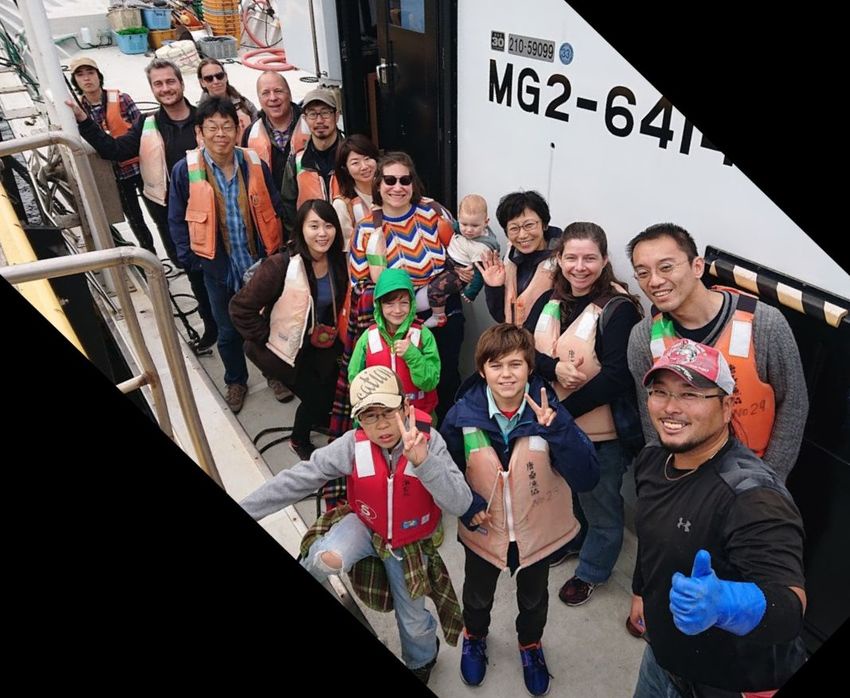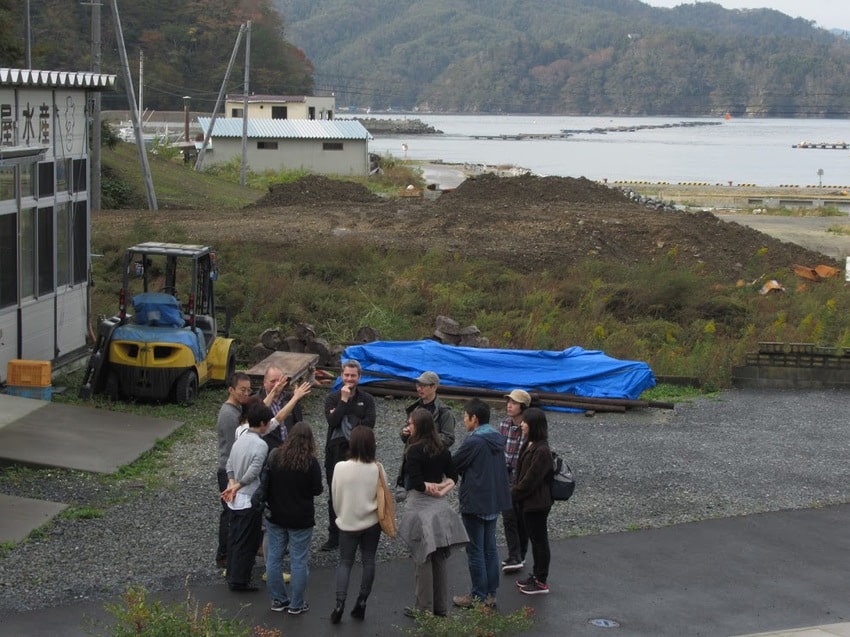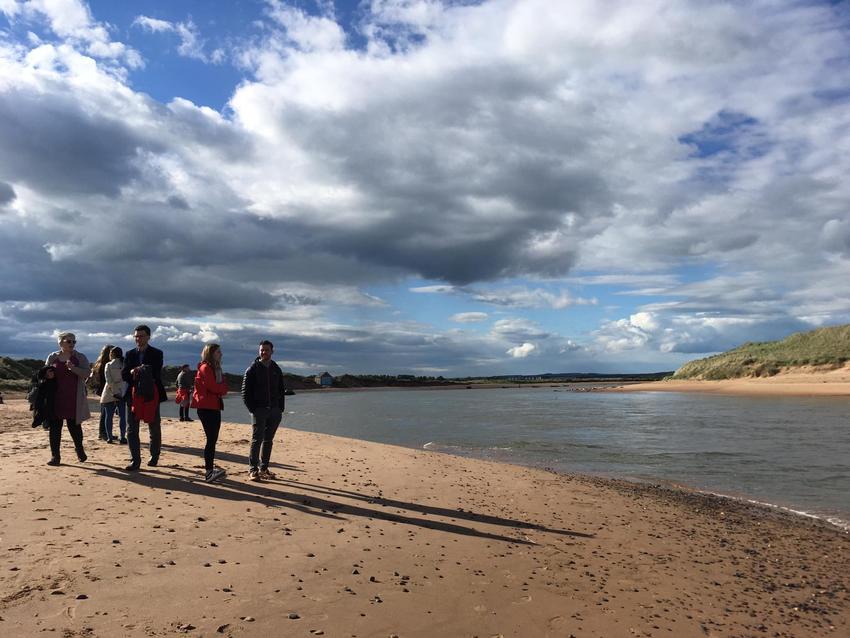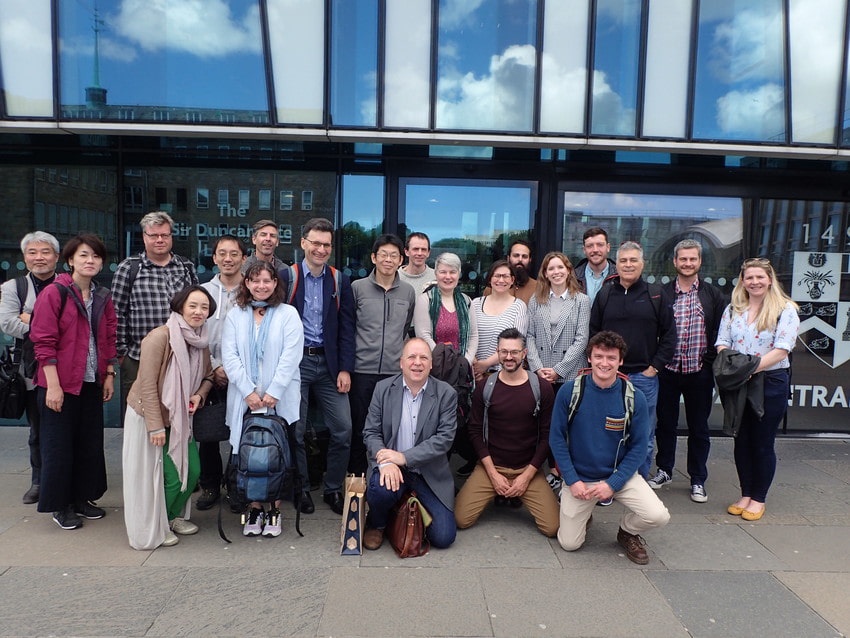
Our group on an oyster fishing expedition
We interviewed a local oyster farmer on his techniques

We interviewed a local oyster farmer on his techniques

Our third seminar was held in Sendai 26-27 October

Our debates were both inside and out along the coast

An international seminar - The Politics and Pitfalls of Maritime Governance - was held in Aberdeen with 32 participants

Experts from around the world took part in our Network's ground-breaking meeting in Sendai, Japan at the Tohoku University.

This project will in
More informaton about our project can be found on the UK Research and Innovation page
This project is to support the establishment of an international research network on the 'political ecology of coastal societies' expanding upon the existing expertise of the University of Aberdeen, Scotland and Tohoku University, Japan. Our network will focus upon four central themes:
Areas of research:
Each of these themes take into account long-standing traditions in both the north and west of Scotland and the North of Japan, reflect the considerable academic and community work our universities have done on these topics. They are further deeply interlinked with recent events and policy initiatives.
The topics will be linked through the holistic vision of 'political ecology' which nests ecological, economic, and social sustainability within the visions and hopes of local communities. Advocates of political ecology argue that environmental risk and environmental change are not simply suffered by communities but are structured by the way that communities organize themselves . There are of course a large number of important developments which are impacting coastal communities today - ranging from sustainability in fisheries, to the emergence of offshore windfarms. We have selected these two issues for two reasons. First, the literature on each has been heavily dominated by top-down “objective” engineering models where the role of social and economic interests has been muted. This project, therefore, offers a social science approach to each topic - which would help cover a “gap in knowledge”. Second, in our two regions, these topics are interlinked. In Northern Japan the relatively recent “3/11” (2011) earthquake and tsunami necessitated both a rethinking of coastal flood risk management and the restructuring of the traditional coastal seaweed industry. The North of Scotland, also recently battered by flood events, is embarking on a new experiment with an industrial form of seaweed harvesting which may not be fully embedded (unlike Japan) in existing, socially constructed sea-tenure systems. Therefore, our project also represents a timely intervention to exchange experience, as well as a unique attempt to apply the intuitions of political ecology to marine environments. It is our hope that through highlighting these two topics we can spark further collaborative research to positively reshape coastal livelihoods which are rapidly modernizing in the face of economic drivers and climatic pressures. Our work will be interdisciplinary, relying primarily upon social anthropological community work supported with expertise in environmental geography and ecology.




In December 2019, Andrew Whitehouse and Shiaki Kondo spent a week in Hokkaido researching Brent Geese 


The second international network event titled: “Politics and Pitfalls of Maritime Governance“ was held in June in Aberdeen hosted by the University of Aberdeen. Twenty four short papers were presented by 21 delegates, followed by several round-table events.
Our discussions were organized around six themes:
Session 6 Coastal Conservation.

We also met to discuss two pilot projects which will take place in November and December, as well as to plan the next meeting of the group in Aberdeen.
On the 10th 
Prof. David G. Anderson , UAberdeen, Project PI (UK)
Dr. Robert Wishart , UAberdeen, Co-PI (UK)
Dr. Tavis Potts , UAberdeen, Co-PI (UK)
Dr. Andrew Whitehouse , UAberdeen
Dr. Jo Vergunst UAberdeen
Mr.Malcolm M Combe UAberdeen
Johanne Verbockhaven UAberdeen
Mr. Simon Peres UAberdeen
Katherine Anderson UAberdeen
Prof. Hiroki Takakura , TohokuU, Project PI (JP)
Dr. Alyne Delaney , TohokuU, Co-PI (JP)
Dr. Minoru Ikeda , TohokuU,
Prof. Masakazu Aoki , TohokuU
Nao Sakaguchi, TohokuU
Prof. Satoshi Katayama, TohokuU
Prof .Taku Iida, Minpaku Osaka
Prof. Kyoko Ueda , SophiaU Tokyo
Prof. Akamine Jun, HitosubashiU
Dr. Shiaki Kondo , CAIS Hokkaido
Prof. Satsuki Takahashi, Hosei
Dr. Jennifer Clarke RGU Aberdeen
Dr. Rebecca Ford UHighlands and Islands
Dr. Emma McKInley Cardiff U
Dr. Liam Carr NIU Galway
Dr. Leslie Mabon RGU Aberdeen
Dr. Tim Stojanovic USt.Andrews
Dr. Laura Watts UEdinburgh
Dr. John MacAskill UEdinburgh
Stephanie Weir HW (ICIT) Orkney
Laura Goyhenex UVersailles SQY
Dr Alex Watson Crook SIFT
Dr Raul Ugarte Acadian Seaplants ltd.
Crawford Paris EGCP
Paula Schiefer UAberdeen
Dr. Malcolm Gibson Acadian Seaplants ltd.
Dr. Kate Johnston HW (ICIT) Orkney
Dr. Sandy Kerr HW (ICIT) Orkney

Page 2 of 4 Results 11 to 20 of 34
Arzyutov, D. (ed.), Anderson, D. G. (ed.), Podrezova, S. (ed.)
Vol. 2/2, Indrik, Moscow. 776 pages
Books and Reports: Books
Arzyutov, D. (ed.), Anderson, D. G. (ed.), Podrezova, S. (ed.)
Vol. 2/1, Indrik, Moscow. 456 pages
Books and Reports: Books
Arzyutov, D. (ed.), Anderson, D. G. (ed.), Podrezova, S. (ed.)
Vol. 1, Indrik, Moscow. 544 pages
Books and Reports: Books
Arts, K., Melero, Y., Webster, G., Sharma, N., Tintarev, N., Tait, E., Mellish, C., Sripada, S., MacMaster, A. M., Sutherland, H., Horrill, C., Lambin, X., van der Wal, R.
Journal of Environmental Management, vol. 265, 110497
Contributions to Journals: Articles
Ewing, S. R., Baxter, A., Wilson, J. D., Hayhow, D. B., Gordon, J., Thompson, D. B., Whitfield, D. P., van der Wal, R.
Global Change Biology, vol. 26, no. 7, pp. 3771-3787
Contributions to Journals: Articles
Gruppuso, P., Whitehouse, A.
Social Anthropology, vol. 28, no. 3, pp. 588-597
Contributions to Journals: Articles
Burdon, D., Potts, T., McKinley, E., Lew, S., Shilland, R., Gormley, K., Thomson, S., Forster, R.
Ecosystem Services, vol. 39, 101009
Contributions to Journals: Articles
Harrault, L., Milek, K., Jardé, E., Jeanneau, L., Derrien, M., Bindler, R., Klaminder, J., Anderson, D. G.
Chapters in Books, Reports and Conference Proceedings: Conference Proceedings
Anderson, D. G.
Contributions to Conferences: Papers
Arts, K., Macleod, C. J. A., Ioris, A. A. R., Han, X., Sripada, S., Braga, J. F., Maffey, G., Jekjantuk, N., Zeng, C., Van der Wal, R.
Science of the Total Environment, vol. 673, pp. 643-655
Contributions to Journals: Articles
